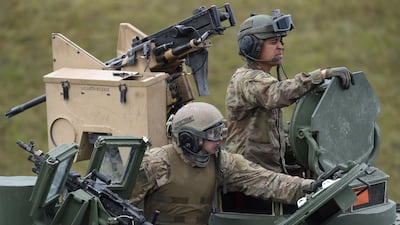US plans to withdraw troops from Germany could threaten the security of the Nato alliance, according to officials. The decision, ordered by US President Donald Trump, will "shake the pillars of the transatlantic relationship", Peter Beyer, the German coordinator for transatlantic ties said on Monday.
Mr Trump ordered the US military to remove 9,500 troops from Germany, reducing the US contingent there to 25,000, a senior US official said on Friday.
Germany said it has received no confirmation of the move. "I don't want to speculate on something for which I have no confirmation," Defence Minister Annegret Kramp-Karrenbauer told a news conference on Monday.
"The fact is, the presence of US troops in Germany serves the entire security of the Nato alliance - so American security too. That is the basis on which we work together."
General Mark Milley, chairman of the joint chiefs of staff, said the decision to withdraw troops had nothing to do with tensions between the US President and German Chancellor Angela Merkel, who blocked Mr Trump's plan to host a G7 meeting this month.
The troop move is the latest twist in relations between Berlin and Washington that have often been strained during the Trump presidency. Mr Trump has pressed Germany to raise defence spending and accused Berlin of being a "captive" of Russia due to its reliance on Russian energy.
"We're not yet at divorce. But we're already at a much lower level of cohabitation than before. It's saddening because what's happened is not in the German, European or American interest," Mr Beyer said.
Nato launched its largest navy exercise of the year on Monday in a dramatic show of strength that will see 28 ships deployed in the Baltic Sea on Russia's doorstep.
High-level leaders in the alliance agreed to assemble the 19-nation armada despite the ongoing coronavirus pandemic.
"We will work together to deter any type of malign activity and be ready to defend," Vice Admiral Lisa Franchetti, commander of the US 6th Fleet leading the exercise told a telephone press conference. "As operations continue we look to the various navies to continue to develop their readiness to respond to any threats that they face at sea," she said.
The exercise, called 'Baltops', includes intense live training with air defence, anti-submarine warfare, maritime interdiction and mine countermeasure operations.
For the first time it will be conducted entirely at sea, with amphibious landing cancelled because of the virus outbreak. France, Germany, Italy, Turkey, Britain and the US are among the nations taking part.
Each ship has been decontaminated and its crew tested for the Covid-19 before setting out. To prevent infection there will be no exchange of personnel between ships during the 10-day deployment.
"Our expectation is that all mariners operate in a safe and professional manner that does not endanger our crews or themselves," the Ms Franchetti said. "That's what we expect to see from the Russian Navy and Air Force. We expect them to do this safely."

